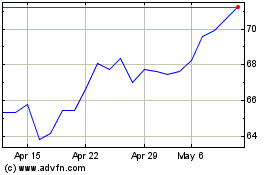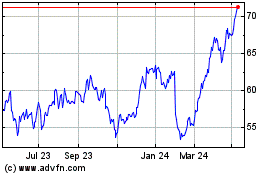Seized Bank Funds Will Go to Terror Victims
February 23 2017 - 5:59AM
Dow Jones News
By Devlin Barrett
Victims of terror attacks against Americans in the 1970s, '80s
and '90s will start receiving checks in coming weeks from a $1.1
billion compensation fund carved out of a settlement struck between
the U.S. government and a French bank, BNP Paribas SA.
The government last week began sending out letters notifying
roughly 2,300 victims or their surviving relatives they were in
line for money from the fund, which was established by Congress in
2015. The fund is designed to compensate people who were injured in
terror attacks before 2001 as well as the families of those
killed.
Those include victims of the 1998 U.S. embassy bombings in
Africa, the 1983 and 1984 attacks on the U.S. Embassy in Beirut,
the families of the hostages taken at the U.S. Embassy in Iran in
1979, and the family of Malcolm Kerr, a university president in
Beirut when he was killed by terrorists in 1984. One of Mr. Kerr's
sons, Steve Kerr, is now a basketball coach in the NBA.
The fund aims to provide compensation to victims of terror
attacks against Americans overseas, many of them U.S. government
employees.
Advocates hope the approach will become a new model for
compensating terror victims. The situation is relatively novel, in
that the BNP settlement was so large and Congress stepped in to
allocate the money. The settlement follows charges that BNP evaded
U.S. sanctions against Iran and other countries for years, creating
a tie between the wrongdoing and the issue of terrorism.
Edith Bartley was a law school student in 1998 when her father
and brother died in an al Qaeda bombing of the U.S. embassy in
Nairobi. She has spent more than 18 years fighting for recognition
and compensation for the victims' families. She said she was
relieved the payments were finally about to go out.
"It's been a very long journey and an exhausting one for me
personally, " she said. "For someone who's walked the halls of
Congress and has the calluses on my feet to show for it, it's still
surreal."
The payments to the victims and their families will be based on
court awards determined in previous lawsuits. Individuals and
families will receive prorated shares -- slightly less than 14% of
the individual court judgments entered in their names, capped at
$20 million for individuals and $35 million for families --
according to officials working on the compensation program.
About $100 million of the fund comes from a settlement the U.S.
government struck with Credit Agricole SA, a French bank, for
violations of U.S. sanctions, but $1 billion of it comes from a
nearly $9 billion settlement struck in 2014 with BNP Paribas for
similar violations. Both banks admitted wrongdoing as part of those
deals.
After those deals were struck, Congress passed legislation
allocating some of that money for terror victims. Some of the money
from the BNP settlement is going to other recipients, such as the
first-responders to the terror attacks of Sept., 11, 2001.
"The money is not from taxpayers, it's from foreign banks who
made billions making an end run around U.S. sanctions and pleaded
guilty to criminal conspiracy," said Stuart Newberger, a lawyer who
represents hundreds of the families eligible for the funds.
Many of Mr. Newberger's clients are CIA families,
foreign-service families, or foreign nationals who worked for the
U.S. government and have waited decades for compensation. "This is
a way to finally say our people who were put in harm's way are
finally going to be taken care of, " he said.
The payment system created by the legislation will continue for
another nine years. Mr. Newberger said he expects new allotments of
cash could be sent to the victims and their families if and when
future criminal settlements are struck with banks for violating
sanctions against terror-sponsoring countries.
The program is run by special master Ken Feinberg, who also
oversaw the compensation fund for victims of the Sept. 11 attacks.
That fund was set up in the immediate aftermath of the attacks as a
means of protecting the airline industry against catastrophic
lawsuits.
Mr. Feinberg praised the Justice Department's handling of the
matter, saying the new program is significant because it finally
addresses historical terror victims. "At long last," he said,
"there is some recognition that victims and their families who are
innocent of any responsibility for these arbitrary terrorist
attacks will receive some degree of compensation -- not enough, but
at least a first step."
Write to Devlin Barrett at devlin.barrett@wsj.com
(END) Dow Jones Newswires
February 23, 2017 05:44 ET (10:44 GMT)
Copyright (c) 2017 Dow Jones & Company, Inc.
BNP Paribas (EU:BNP)
Historical Stock Chart
From Aug 2024 to Sep 2024

BNP Paribas (EU:BNP)
Historical Stock Chart
From Sep 2023 to Sep 2024
